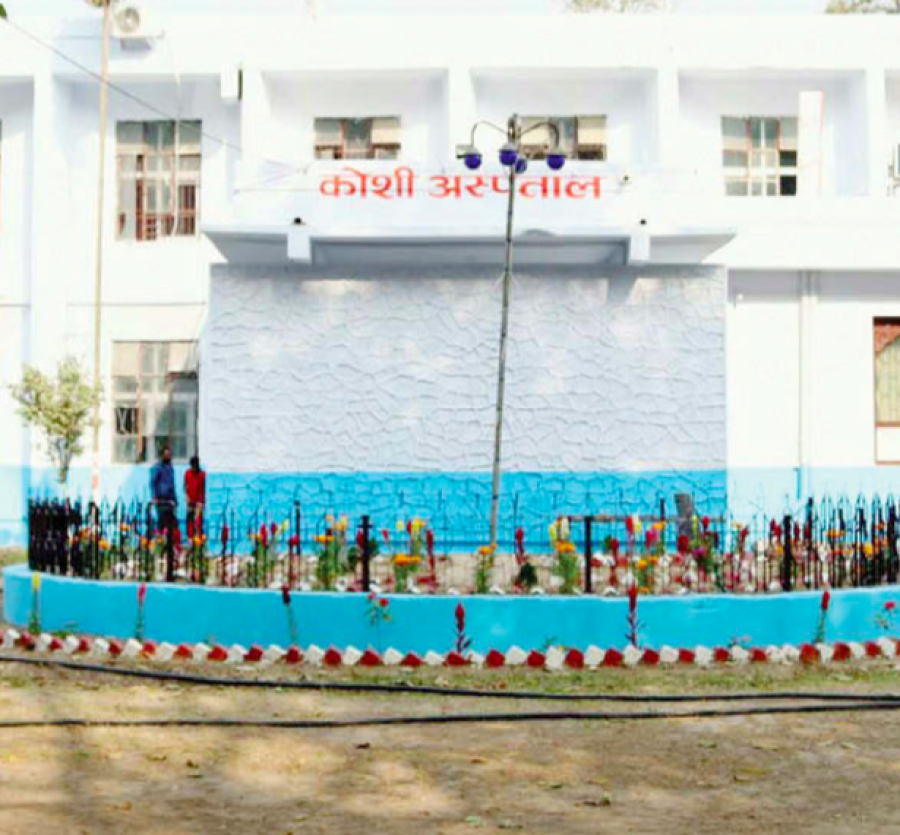Health
Udayapur is a ticking time bomb, warn doctors, as more Covid-19 cases are identified
While doctors suspect that Nepal has already entered stage 3 of the pandemic—community transmission—the Health Ministry says all cases are interrelated.
Arjun Poudel
With 14 Covid-19 cases reported from one neighbourhood–Bhulke of Triyuga Municipality–in Udayapur in a span of two days, public health experts warn of a sudden surge in the days to come as they believe there is a strong possibility of community transfer. With three new cases on Wednesday, Nepal’s Covid-19 tally has reached 45 with more than half from Udayapur alone—three cases on Wednesday, 11 on Tuesday, one on Saturday, and 12 on Friday.
"It has now become imperative that the authorities take swift action to trace all those who came in contact with those infected with the coronavirus,” said Dr Anup Subedee, a consultant infectious disease physician. “The authorities must act, as it looks like Udayapur is a ticking time bomb and we are running out of time.”
Until Tuesday, Nepal had reported only one case of local transmission in Kailali, which had taken the country into stage 2 of the Covid-19 pandemic.
The sudden rise in the number of cases in Udayapur, according to experts, could be a result of mass community transfer, which would take the country into stage 3.
“The country is in stage 3 now, as it looks like community transmission,” said Dr Baburam Marasini, former director of the Epidemiology and Disease Control Division. “Some people who are not associated with the people from India or their family members have also tested positive for the virus.”
Of the 27 people who tested positive for Covid-19 in Udayapur, 11 are Indians who were residing in a local mosque. Authorities are still trying to figure out the places they had visited before reaching Udayapur.
Marasini, however, expects that the situation in Udayapur will come under control as disease-hit areas have been sealed off.
“But we cannot rule out more cases in other parts unless the outbreak stops in India,” said Marasini.
India has been reporting a steady rise in the number of Covdi-19 cases, with 20,471 infections and 652 deaths until Wednesday.
“If we fail to contain the spread, it won’t take time for us to reach the epidemic stage, which means simultaneous outbreaks in many places, in which transmission gets out of control and the disease has no clear end," said Marasini.
Stage 2 or local transmission is when people bring the virus into the country and transmit it to people they come in close contact with, usually friends and family.
Stage 3, or community transmission, is when infections start appearing in people with no connection to those who’ve returned from abroad. Locally infected people pass the virus to others in the community in this stage, say doctors.
“Contact tracing and more tests become a must then,” said Subedi.
Health Ministry officials, however, said that Nepal has not reached stage 3 yet.
"All those who are infected with the virus are from the same group and were found to be eating from the same kitchen," Dr Khem Karki, advisor to Health Minister Bhanubhakta Dhakal, told the Post, referring to the Udayapur cases.
Karki also dismissed the Indian nationals’ claim that they arrived in Nepal four months ago.
"Their claim that they have been in Nepal for the last four months is just a story they created,” said Karki. “They entered Nepal about two weeks ago but are not admitting it because that would mean they were travelling during the lockdown.”
Udayapur’s Chief District Officer told the Post on Friday that they had arrived in Udayapur from Biratnagar via Saptari.
Karki, however, admitted that the risk level has been raised by the detection of several cases at once.
The World Health Organization has been urging countries to isolate, treat and trace, while testing all suspects, especially those who’ve returned from abroad.
The Health Ministry has been conducting rapid diagnostic tests on people in quarantine and sending them home if they test positive on the rapid tests but negative on the polymerase chain reaction tests.
But doctors say the contacts of all those who test positive on the rapid tests should be traced and tested as they could carry the disease.
According to the Health Ministry, 40,431 Covid-19 tests, including 9,011 polymerase chain reaction tests, had been performed as of Wednesday. Rapid diagnostic tests are currently being performed in all 77 districts.
“We should also strengthen our surveillance and health care systems and form a powerful agency like America’s CDC [Center for Disease Control and Prevention] to deal with outbreaks, epidemics and pandemics,” said Marasini.




 9.83°C Kathmandu
9.83°C Kathmandu















